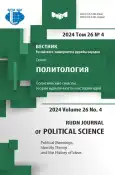The Sociology of Karl Mannheim’s Knowledge and the Methodological Foundations of the History of Socio-Political Ideas
- Authors: Chanyshev A.A.1, Kuznetsova V.A.1
-
Affiliations:
- MGIMO University
- Issue: Vol 26, No 4 (2024): Political Meanings, Identity Theory and the History of Ideas
- Pages: 685-699
- Section: FROM THE HISTORY OF IDEAS
- URL: https://journal-vniispk.ru/2313-1438/article/view/322401
- DOI: https://doi.org/10.22363/2313-1438-2024-26-4-685-699
- EDN: https://elibrary.ru/YUEKPX
- ID: 322401
Cite item
Full Text
Abstract
The methodological principles of K. Mannheim’s sociology of knowledge still have fundamental significance for the study of the history of ideas (and the history of political thought). This significance is determined, firstly, by the critical attitude inherited by Mannheim from the Marxist tradition. In this case, however, criticism is not aimed at simplistically linear “exposure” of the social orientation of ideas, where the content of the latter is explained as a simple function of the author’s predilections and group interests that determine these predilections - and the desired source of the ideological content of the concept, therefore, can be found in the sphere of the “natural” action of common social causes. The critical analysis is focused on understanding the “existential” rootedness of ideas. The analysis suggests that theory is not only and not so many ideas per se, but also the author’s lived attitude to the specific historical conditions of their existence. It is the identification of this kind of rootedness that prevent the content reduction of the author’s position to purely subjective, psychological moments of the experience. The authors suggests that the conceptualization of the rootedness can be carried out on the basis of the “hermeneutic circle” and “anticipation” in the Heidegger-Gadamer “ontological” interpretation of them, as well as through the application of the “life-world” in the Schutz’ interpretation. Ultimately, the study was designed to determine that it is due the heuristic possibilities of such interpretations that the actual socio-cultural meaning of the concept, not necessarily realized by the creator himself, saturated with normative, evaluative, subjective content, but tied to an objective tradition, can be identified and understood. In addition, the authors consider as a promising research task the possibility of strengthening the methodological completeness of the sociology of knowledge by the historical and conceptual approach of R. Koselleck, which would ensure a more thorough alignment of the socio-normative tradition with the problems of a specific theory.
About the authors
Alexander A. Chanyshev
MGIMO University
Author for correspondence.
Email: chanishev@bk.ru
ORCID iD: 0000-0001-9117-6279
PhD in Philisophy, Associate Professor at the Department of Political Theory
Moscow, Russian FederationVasilisa A. Kuznetsova
MGIMO University
Email: vasilisa13kuz@gmail.com
ORCID iD: 0000-0002-0557-1908
graduate student of the School of Governance and Politics
Moscow, Russian FederationReferences
- Althusser, L. (2011). Ideology and ideological apparatuses of the state (notes for research). Neprikosnovennyj zapas, 3(77), 150–175. (In Russian).
- Gadamer, G.-G. (1991). Philosophy and hermeneutics. In The relevance of pre-red (pp. 9–15). Moscow: Iskusstvo publ. (In Russian).
- Mannheim, K. (1994). Ideology and utopia. In Mannheim, K. Diagnosis of our time (pp. 7–276). Moscow: Yurist publ. (In Russian).
- Schütz, A. (1994). Formation of the concept and theory in the social sciences. In American Sociological Thought: Texts (pp. 481–496). Moscow: MSU Publishing House. (In Russian).
- Weber, M. (1990). “Objectivity” of socio-scientific and political cognition. In Weber, M. Selected works (pp. 345–415). Moscow: Progress publ. (In Russian).
- Kozellek, R. (2016). “Space of experience” and “Horizon of expectations” — two historical categories. Sociology of Power, 28(2), 149–173. (In Russian).
- Lovejoy, A. (2001). The great chain of being: The history of an idea. Moscow: Dom intellektual’noj knigi publ. (In Russian).
- Hugenholtz, W.R. (2001). The concept of advanced study in the humanities. In The Philosophic century. The Almanac. Issue 17. The history of ideas as a methodology of humanitarian research. Part 1 (pp. 89–97). Saint Petersburg: The St Petersburg Center for the history of ideas (In Russian).
- Koselleck, R. (1995). Begriffsgeschichte und Sozialgeschichte. Vergangene Zukunft: zur Semantik geschichtlicher Zeiten. 3. Aufl. (ss. 107–129) Frankfurt am Main: Suhrkamp.
- Koselleck, R. (2006). Begriffgeschichten. Studien zur Semantik und Pragmatik der politischen und socialen Sprache. Frankfurt a. Main: Suhrkamp.
Supplementary files









